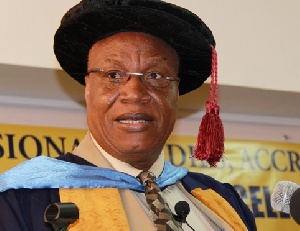 Prof. Joshua Alabi, former Vice-Chancellor, UPSA
Prof. Joshua Alabi, former Vice-Chancellor, UPSA
Joshua Alabi, former Vice-Chancellor of the University of Professional Studies, says tertiary education must be accessible to everyone since it is a right.
The former Chancellor made the call when he delivered a paper at the 3rd Baraka Policy Institute Public lecture held at the Ghana Academy of Arts and Science.
According to him, it is at the point of tertiary education that many people discover their destinies and develop their abilities to contribute meaningfully to society.
“The lack of access to tertiary education is an unfortunate loss of talent and valuable contribution to nation building,” Prof Alabi observed.
He added that entry requirements to tertiary institutions in Ghana are among the strictest in Africa, which he described as based on “specifications and not standards.”
He explained further, “Specifications are specific requirements that are developed either by an individual or group for a particular product. Standards on the other hand are generally accepted specifications accepted by the stakeholders affected by it.”
“It is very sad to note that applicants with D grade or lower in any core subject cannot enter a university in Ghana irrespective of their performance in other areas. However, other countries even the UK that introduced Ghana to tertiary education accepts them. Do we have substantial evidence to suggest that those with at least one D grade in any of the core subjects are not capable of tertiary education in Ghana?” he asked.
Professor Alabi also advocated for more open and distance education system, which he believed was one of the many ways to enhance both access and quality if done well.
“In this respect, a national draft policy on the Open and Distance Learning should be developed, properly communicated at the national level and implemented. This will require the support of a National Qualifications Framework for mapping and recognition of Prior Learning as described in the Education Sector Performance Report,” he added.
Prof Alabi proposed that in order to enhance quality tertiary education, there must be the review and revision of tertiary curriculum and instructional design and methodologies to make them more learning centered, learning oriented and needs based .
“Though these interventions will go a long way to improve quality of tertiary education in Ghana, we require a transformation of teaching strategies for quality to improve. This will require a complete paradigm shift that will require training and retooling of academic staff to make teaching at the tertiary level more practical and suited to the needs of society,” he noted.
The event was chaired by Alhassan Andani, Managing Director of Stanbic Bank Ghana. It was attended by academics, researchers, community leaders, politicians, chiefs, tertiary and high school students, and Members of Parliament.